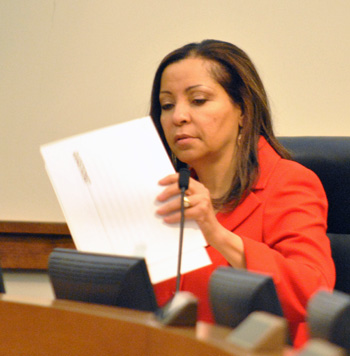Snow owl? [photo]
Archive for February, 2012
Third & Washington
Red rose petals scattered along the sidewalk across from the YMCA. It was either a very good Valentine’s Day, or a very bad one. [photo]
UM: Stem Cells
The Detroit Free Press reports that the U.S. National Institutes of Health has authorized an embryonic stem cell line developed by University of Michigan researchers to be eligible for federally funded research. The line – known as UM4-6 and cultivated by Gary Smith, co-director of the UM Consortium for Stem Cell – is now listed as the 147th stem cell line in the NIH registry, according to the report. [Source]
Land Use, Transit Factor Into Sustainability
How do Ann Arbor’s land use policies affect where people live and work, and the way they get from one place to another? What is the city doing to support sustainable approaches?
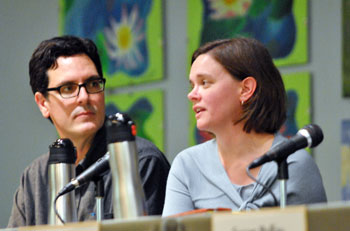
Joe Grengs, a University of Michigan associate professor of urban and regional planning, and Ginny Trocchio, who manages the city's greenbelt program, were among the speakers at a Feb. 9 sustainability forum.
Issues of land use and accessibility were the topic of a sustainability forum on Feb. 9, the second in a series that’s part of a broader city sustainability initiative. During the forum, city staff also unveiled a set of draft goals for Ann Arbor related to four general sustainability themes: Resource management; land use and access; climate and energy; and community.
Wendy Rampson, head of the city’s planning staff, told the audience that the 15 draft goals were extracted from more than 200 that had been identified in existing city planning documents. The hope is to reach consensus on these sustainability goals, then present them to the city council as possible amendments to the city’s master plan.
Speakers at the Feb. 9 forum included Joe Grengs, a University of Michigan associate professor of urban and regional planning; Susan Pollay, executive director of the Ann Arbor Downtown Development Authority; Eli Cooper, the city’s transportation program manager and member of the Ann Arbor Transportation Authority board; Jeff Kahan of the city’s planning staff; Ginny Trocchio, who manages the city’s greenbelt program; and Evan Pratt of the city’s planning commission.
A Q&A followed presentations by the speakers and covered a wide range of topics, including thoughts on the proposed Fuller Road Station. The following day, Feb. 10, the city and University of Michigan announced plans to halt the initial phase of that controversial project – a large parking structure near the UM medical campus.
The topics of the series of forums reflect four general sustainability themes: Resource management; land use and access; climate and energy; and community. The first forum, held in January, focused on resource management, including water, solid waste, the urban forest and natural areas.
All forums are held at the downtown Ann Arbor District Library and are being videotaped by AADL staff. The videos will be posted on the library’s website. Additional background on the Ann Arbor sustainability initiative is on the city’s website. See also Chronicle coverage: “Building a Sustainable Ann Arbor,” and an update on the project given at the November 2011 park advisory commission meeting. [Full Story]
Man Fights City, Settles Pothole Damage Claim
Almost exactly one year ago, on the rainy evening of Feb. 17, 2011, Chronicle reader Matt Hampel filed a 13-word Stopped.Watched. item about pavement problems on Huron Street: “Looks like southern lane of Huron west of Seventh has buckled. Police, flares.”

Is Ann Arbor the kind of city where even the potholes are heart-shaped? (Photo illustration by The Chronicle.)
A visit to the scene by The Chronicle found city crews wrapping up their work, filling in some potholes in both the eastbound and westbound lanes.
Unknown to The Chronicle at the time, another reader, Eric Wucherer, had encountered the potholed pavement on Huron Street that same evening, sustaining two flat tires.
And Wucherer was not the only driver to sustain vehicle damage due to the same set of potholes. As he described it in the web-based service request that he logged near midnight: “Pulled over behind someone with a flat tire from the same pothole, who was able to deploy their spare tire. With 2 flats, I got towed …”
Over the next few months, Wucherer filed a request under the Freedom of Information Act to obtain records of complaints made about potholes at that location. He filed a claim with the city’s board of insurance administration – it was denied. He filed an appeal of the denial – it was rejected.
Then Wucherer did something at that point in the process that no one else has tried in assistant city attorney Bob West’s recollection over the last 16 years: Wucherer filed against the city of Ann Arbor in the small claims division of the 15th District Court.
Under Act 236 of 1961, attorneys aren’t allowed to argue on behalf of clients in small claims court. But defendants in small claims court – in this case, the city of Ann Arbor – are allowed to demand that the case be removed from small claims to the general civil docket. And the city of Ann Arbor exercised its right to do that. That permitted West to handle the case.
The case was set up for West to argue, among other things, a standard governmental immunity defense on behalf of the city. But before Wucherer and West squared off – in a case that had been assigned to be heard by then-judge Julie Creal – the city offered to settle the claim.
And on Sept. 22, 2011 the city’s board of insurance administration authorized a settlement with Wucherer for $568.16. In his claim he’d asked for $750 to cover damage to tires, wheels and an axle.
In reporting this article, The Chronicle reviewed nearly a year’s worth of vehicle damage claims brought before the board of insurance administration. They included a range of vehicle damage – allegedly caused by potholes, garbage trucks, a police car, or falling tree branches.
After the jump we take a brief look at the defense the city would have made in court in the Wucherer pothole case, and the way the city approaches pothole repair, as well as some of the other types of vehicle damage claims. [Full Story]
AAPS Weighs State’s Impact on Budget
Ann Arbor Public Schools Board of Education regular meeting (Feb. 8, 2012): At a meeting of the AAPS board of education with a relatively light agenda, trustees discussed the anticipated state education funding incentives revealed by Gov. Rick Snyder last week.
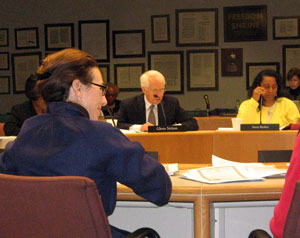
AAPS board member Christine Stead. Across the table from Stead (and Deb Mexicotte, who's seated to Stead's right out of the frame) are board members Glenn Nelson and Susan Baskett. (Photos by the writer.)
Contending that any increases would do little to rectify the compounding losses of funding since the passage of Proposal A, trustee Andy Thomas summarized the state’s budget plan as: “One hand giveth and the other hand taketh away.”
Trustees also agreed to move to a paperless system of board documents. In other business, the board agreed to change the district’s liability insurance carrier, and joined an emerging advocacy group – the Washtenaw Alliance for Education.
Also at the meeting, the board heard from two sets of students, after making a conscious effort recently to increase student engagement at the board level.
The board also engaged in an uncommon back-and-forth with members of the audience, which stemmed from public commentary about a Thurston Elementary School teacher who’s been placed on administrative leave. [Full Story]
Huron & State
Multiple police and fire trucks at Campus Inn. Battalion Chief indicates a third-floor water leak triggered a false alarm.
Planning Commission Upholds A2D2 Zoning
Ann Arbor planning commission meeting (Feb. 7, 2012): In their main action item at Tuesday’s meeting, planning commissioners voted unanimously against a rezoning request at 1320 S. University – reaffirming one of the decisions of the contentious, multi-year A2D2 initiative that was approved by the city council in 2009.
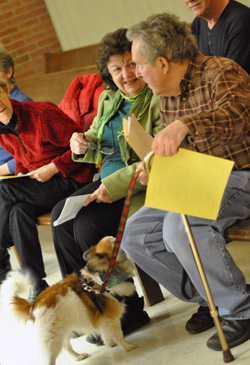
Bob Snyder, with his dog Walter, talks with Gwen Nystuen before the start of the Feb. 7 planning commission meeting. Both Snyder and Nystuen spoke during a public hearing to oppose rezoning of 1320 S. University. (Photos by the writer.)
Currently at the site – on the south side of South University, between Forest and Washtenaw avenues – is the three-story Park Plaza apartment building. It’s owned by Philip Sotiroff, who hoped to construct a mixed-use building – retail and residential – as tall as 145 feet. That height would allow for a structure between 10-14 stories on the 0.82-acre site. The current zoning is D2 (downtown interface), which does not allow for a structure taller than 60 feet.
Sotiroff is asking the city to rezone the parcel to D1, a zoning district that allows for the greatest density development. Representatives from his development team noted that higher density zoning was allowed prior to 2009, and pointed out that initially the D1 designation had been recommended by the planning commission before the final version of A2D2 was adopted.
The site is adjacent to a D1 parcel to the east, where the Landmark apartment building is being constructed, at 601 S. Forest. But the 1320 S. University property also abuts lower-density residential zoning. Single-family homes are located to the south of the site, and a fraternity is located to the west.
Fifteen people spoke during a public hearing about the rezoning. Most of them were residents and neighborhood leaders who objected to the proposed rezoning, though the request did receive letters of support from owners of the Landmark as well as from the South University Area Association, a merchants’ group.
Planning staff recommended denial. All of the planning commissioners spoke in support of the current zoning, saying that the community had reached a hard-won consensus that was not to be overturned lightly, especially since it was implemented fairly recently. A couple of commissioners noted that the owner could find flexibility within the existing zoning by submitting a planned project – like the 618 S. Main development that planning commission approved at its Jan. 19, 2012 meeting. [Full Story]
Liberty & Dartmoor
Model Ann Arbor citizen clearing snow from sidewalk leading to AATA Route 12A bus stop on south side of Liberty, as well as the area around the stop. Thank you, ma’am, it made catching the bus from there a bit easier this morning.
UM: Lacrosse
The New York Times profiles the University of Michigan men’s lacrosse team, and its transition from a club to a varsity sport. “Although women’s varsity teams have cropped up at high-profile Football Bowl Subdivision universities like Florida and Southern California in recent years, men’s programs have been elusive quarry. Michigan, which opens its inaugural varsity season Sunday, is one of 13 F.B.S. colleges with a men’s lacrosse team — and the first to add the sport since President Reagan took office. The expansion of Division I men’s lacrosse, which is not a revenue sport, at F.B.S. universities has been hindered largely by high overhead costs and Title IX compliance. Michigan leapt these hurdles with a grass-roots approach.” [Source]
Washtenaw: Kitchen Incubator
Washtenaw County’s office of community and economic development is considering starting a a food system workforce development program and commercial kitchen incubator. An online survey is collecting information about existing and potential businesses that could be helped by this initiative. Questions include ”What stage of development is your food-based business?” “What activities would you use a shared-used commercial kitchen for?” and “What business services would you need or desire in a shared use kitchen?” [Source]
AATA Service to DTW on Feb. 16 Agenda
A proposal long in the works to provide public transportation service between Ann Arbor and Detroit Metropolitan Airport will appear on the agenda of the Ann Arbor Transportation Authority board at its Feb. 16 meeting. The AATA will contract out the service through Indian Trails (Michigan Flyer).
Details of the service include a one-way fare of $12 for advance reservation (and limited refundability) or $15 with re-fundability up to time of departure. Round trip fare would be $22 for advance reservation (and limited refundability) or $30 with refundability up to time of departure. The resolution also provides for an introductory promotional offer of $10 one-way and $20 round trip. Volume discounts also may be available for groups of up to eight people traveling together. [.pdf of ... [Full Story]
UM, Ann Arbor Halt Fuller Road Project
According to a statement released on Feb. 10, 2012, the University of Michigan and the city of Ann Arbor have halted plans for the proposed Fuller Road Station as it’s currently conceived – a city/UM parking structure, bus depot and possible train station located at the city’s Fuller Park near the UM medical complex.
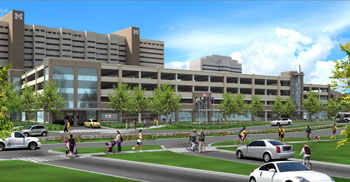
An architectural drawing of the proposed Fuller Road Station. (Image links to city of Ann Arbor webpage on the Fuller Road Station)
The press release includes a statement from mayor John Hieftje, which reads in part: “After months of fruitful discussions, we received new information from the Federal Rail Administration regarding the eligibility of monies for the local match. This information altered project timing such that we could no longer finalize a proposal under the current Memorandum of Understanding.”
On the university’s side, Jim Kosteva – director of community relations – is quoted in the press release as follows: “We are optimistic the city’s drive to win additional federal and state dollars for Fuller Road Station will be successful …When the time comes, we stand ready to reengage.” [.pdf of press release]
The press release also includes the news that the university will build the parking deck it had planned for the Fuller Road Station site at a different location: “… it is acknowledged that the University will need to move forward with building a parking structure, in a yet to be determined location, near the Medical Campus to address the expected demand as employment and patient activity continues to grow.”
The university was primarily interested in the initial phase of the project, a large parking structure with more than 1,000 spaces planned.
The city of Ann Arbor’s main interest was in the second phase of the project – a multimodal transit center that city officials hope would include a new Amtrak station, bus depot and sufficient parking for those needs. That component of the project appears to be very much still in play, contingent on identifying funding.
The Chronicle has compiled a timeline overview of Fuller Road Station with links to previous coverage. After the jump, we look at: (1) the train/bus station component of the project; (2) what led UM to initially participate in the project; (3) what happened since a memorandum of understanding between the city and the university was ratified; and (4) the timing of the decision to halt the project. [Full Story]
Totter Toons: Fuller Road Station
Action on Countywide Transit Still Paused
Ann Arbor city council meeting (Feb. 6, 2012): As expected, the council postponed consideration of a four-party agreement that would establish a framework for transitioning the Ann Arbor Transportation Authority to a countywide system. The agreement would be between the city of Ann Arbor, the city of Ypsilanti, Washtenaw County and the Ann Arbor Transportation Authority.
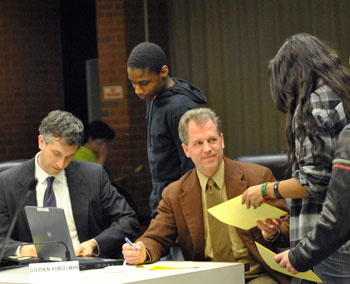
Christopher Taylor (Ward 3) and Stephen Kunselman (Ward 3) sign agendas for students who attended the Feb. 6 meeting to complete a class assignment. (Photos by the writer.)
The AATA had requested the postponement until March 5. The council ultimately agreed to do that, but not before thoroughly debating the merits of March 5 versus March 19, or even some unspecified date in the future. In the end, the resolution to postpone included a stipulation that the mayor or city administrator could take the item off the March 5 agenda, if a funding recommendation and 5-year service plan are not provided to the council by the AATA in a timely way for the March 5 meeting. A meeting of a financial advisory group, co-chaired by McKinley Inc. CEO Albert Berriz and retired Washtenaw County administrator Bob Guenzel, is scheduled to take place on Feb. 29.
In other business, the council approved the tentative award of a $92,929,000 contract with Walsh Construction Company II to undertake a major renovation project at the city’s wastewater treatment plant. During public commentary, the council heard from Glenn Granger, whose company was one of two that had submitted lower bids than Walsh. City staff evaluating the bids did not agree with Granger’s contention that his company had comparable previous experience with a project of similar complexity.
The council gave final approval to a revision to the Arlington Square planned unit development, which grants the developer additional types of uses, without imposing additional parking requirements. The council also appointed a hearing officer for the coming year’s liquor license review process – councilmember Tony Derezinski (Ward 2), who also served last year in that capacity.
Highlights of public participation included commentary from a group that has been advocating for a warming center for the homeless. [Full Story]
Liberty & Division
Liberty Plaza is no longer occupied.
Column: Super Bowl Reflections
It’s been five days since the Super Bowl, just enough time to give us a little perspective on the whole thing. Was it a football game? A concert? A competition for the Clio Award? Or some bizarrely American combination of all three?
Let’s start with the least important: The football game. You might have caught bits of it, squeezed between the ads and the show. How could you tell when the game was on? Those were the people who ran really fast, and wore clothes.
For the Super Bowl’s first 30 years, most of the games were boring blowouts. I suspect even the players can’t recall the scores of those snoozers.
But the ads and the halftime shows were hard to forget, and often featured a member of the Jackson family having his hair ignited or her wardrobe mysteriously malfunction.
But lately, it’s been the other way around. Ten of the past 16 games have been barn burners – and the rest of the stuff is putting us to sleep. [Full Story]
Liberty & Division
After gas line was broken by construction activity earlier this afternoon, as of 9 p.m. Bar Louie is open. Wait staff removing “Closed Gas Leak” signs from door. An ABC Brassiere Blonde will sustain me after attending the second in series of city of Ann Arbor sustainability forums at Ann Arbor District Library.
Liberty & Division
Guessing a gas line was punched, by Google building on Division. Fire department just leaving now.
Wall Eyes Ann Arbor Mayoral Campaign
In a press release issued Thursday afternoon, Feb. 9, Tom Wall said he is considering a run for Ann Arbor mayor and is asking for support to fill crucial positions – including campaign manager and fundraising director – before making a final decision. [.pdf of Wall's announcement] Wall is owner of All Star Driver Education, and has run for mayor twice before.
In November 2006, Wall ran as an independent against incumbent Democrat John Hieftje, getting 21% of the vote. In August 2008, Wall contested the Democratic primary against Hieftje, getting 31% of the vote.
In his press release, Wall attributes his previous election performance to not having the “necessary organizational support.” He asks for people to step forward to fill the roles … [Full Story]
A2: Domestic Partners
The Detroit Free Press published a guest column by Jenny Oorbeck of Ann Arbor, who argues that decisions like the state’s recent ban on public employers offering benefits to domestic partners make Michigan an unwelcoming state. She notes other reasons why Michigan falls short: ”Thanks to our discriminatory laws, I have no legal relationship with my younger son, who was born here (I am not his biological mother), which is absurd. By contrast, our older son, born in California (again, I am not his biological mother) is legally my child. I was listed on his birth certificate because California recognizes our marriage. To us, it is a mark of shame on Michigan that only one of our sons has two legally recognized … [Full Story]
400 block S. Fifth Ave
City Place project sprouting above ground at an alarming rate: [photo]
UM: Muslim Chaplain
National Public Radio reports on the hiring of a Muslim chaplain this year at the University of Michigan – the first public university to have this kind of endowed position. The chaplaincy is funded through donations solicited by the Michigan Muslim Alumni Foundation. The job is held by Mohammed Tayssir Safi, who told NPR: “There’s not a solid environment where a Muslim feels — perhaps ‘safe’ is the right word, not from violence but safe as in they feel safe and at home in being able to express themselves and who they are.” [Source]
Jackson & Wagner
A WAVE bus sitting at the side of the road, near a bus stop with a number of people waiting for an incoming bus (to Ann Arbor). Countywide transit in action.
Thompson & Jefferson
Dave Brandon media scrum following Wednesday’s special UM regents meeting. [photo]
UM Regents OK NHL Use of Stadium
At a special meeting called for Feb. 8, 2012, the University of Michigan board of regents voted unanimously to approve the use of Michigan Stadium for the National Hockey League’s Winter Classic, which is scheduled for Jan. 1, 2013. The NHL will pay $3 million for the license to use the stadium from Dec. 1, 2012 until mid-January. Areas surrounding the stadium would be used for a more limited period.
In January of this year, various media outlets reported that the 2013 Winter Classic would be held at Michigan Stadium, between the Detroit Red Wings and the Toronto Maple Leafs. There has not yet been an official announcement from the NHL.
According to a staff memo, the university would be responsible for providing support … [Full Story]
Fourth & Washington
Blue Tractor closed Tuesday and Wednesday (Feb. 7-8). Spotted some patrons looking for alternative options after Tuesday night’s planning commission meeting.
Rezoning Denial Recommended on South U.
At its Feb. 7, 2012 meeting, the Ann Arbor planning commission voted unanimously to recommend denial of a rezoning request for 1320 S. University Ave., where the three-story Park Plaza apartment building is located. The property – on the south side of South University, between Forest and Washtenaw avenues – is owned by Philip Sotiroff, who hoped to build a mixed-use (retail and residential) building as high as 145 feet. That height would allow for a structure of between 10-14 stories on the 0.82-acre site. The current zoning – D2 (downtown interface) – does not allow for a structure taller than 60 feet. The city’s planning staff had also recommended denial of the rezoning request.
Fifteen people spoke during a public hearing about the … [Full Story]
UM Regents to Hold Special Meeting
The University of Michigan board of regents has called a special meeting on Wednesday, Feb. 8 at 10 a.m. According to a press release issued on the afternoon of Feb. 7, the topic of the meeting regards authorization to enter into a facility-use lease for the National Hockey League’s Winter Classic. The Winter Classic is held in early January at an outdoor venue. In January of this year, various media outlets reported that the 2013 Winter Classic would be held at Michigan Stadium, between the Detroit Red Wings and the Toronto Maple Leafs. There has not yet been an official announcement from the NHL.
The regents’ Feb. 8 meeting is open to the public and will be held at the boardroom of … [Full Story]
County Preps for More Restructuring
Washtenaw County board of commissioners working session (Feb. 2, 2012): Commissioners got a preview from county administrator Verna McDaniel about plans for more restructuring of Washtenaw County operations, in the wake of 117 retirements at the end of 2011 and an ongoing need to cut costs.
McDaniel is asking departments to explore a “continuum of opportunities,” from cooperation on one end of the spectrum, to consolidation on the other end. As an example, she noted that the recent 911 dispatch consolidation between the city of Ann Arbor and the Washtenaw County sheriff’s office – an agreement at the county board approved at its Jan. 18, 2012 meeting – began as cooperation, when county dispatchers co-located with Ann Arbor’s operations.
As an initial step, at the board’s Feb. 15 meeting McDaniel will be asking for approval to restructure support services in administration, finance, information technology and facilities management. The changes entail creating a new “cross-lateral” team of four current senior managers, and putting two positions – including the job of deputy county administrator – on “hold vacant” status. Another nine positions will be eliminated, while eight jobs will be created. The restructuring will result in a net reduction of three full-time jobs, and estimated annual savings of $326,422.
Commissioners were generally supportive of her proposal, though some cautioned against creating the expectation that the county can provide the same or a better level of services with reduced resources. The county is facing projected deficits of $11.6 million in 2014 and $14.7 million in 2015.
Also at the Feb. 2 working session, board chair Conan Smith gave an update on negotiations with the Humane Society of Huron Valley, saying he hopes to bring an agreement for board approval at their Feb. 15 meeting. The contract would cover animal control services for the remainder of 2012, with the intent of working toward a longer-term agreement for the coming years. The county plans to ask local municipalities that have animal control ordinances – including Ann Arbor and Ypsilanti Township – to help pay for services provided under contract with HSHV.
The board also got a brief update on the $1.3 million in renovations at the downtown county courthouse. The project, which started early last year when Ann Arbor’s 15th District Court vacated the courthouse to move to the city’s new Justice Center, will be wrapping up in mid-March.
The working session included an agenda briefing for the Feb. 15 meeting, but some commissioners expressed discontent at the new format, which had been implemented earlier this year. Wes Prater suggested that if the briefings do not include time for commissioners to ask questions, then the information might as well be emailed to them instead. “I believe all of us can read,” he said.






